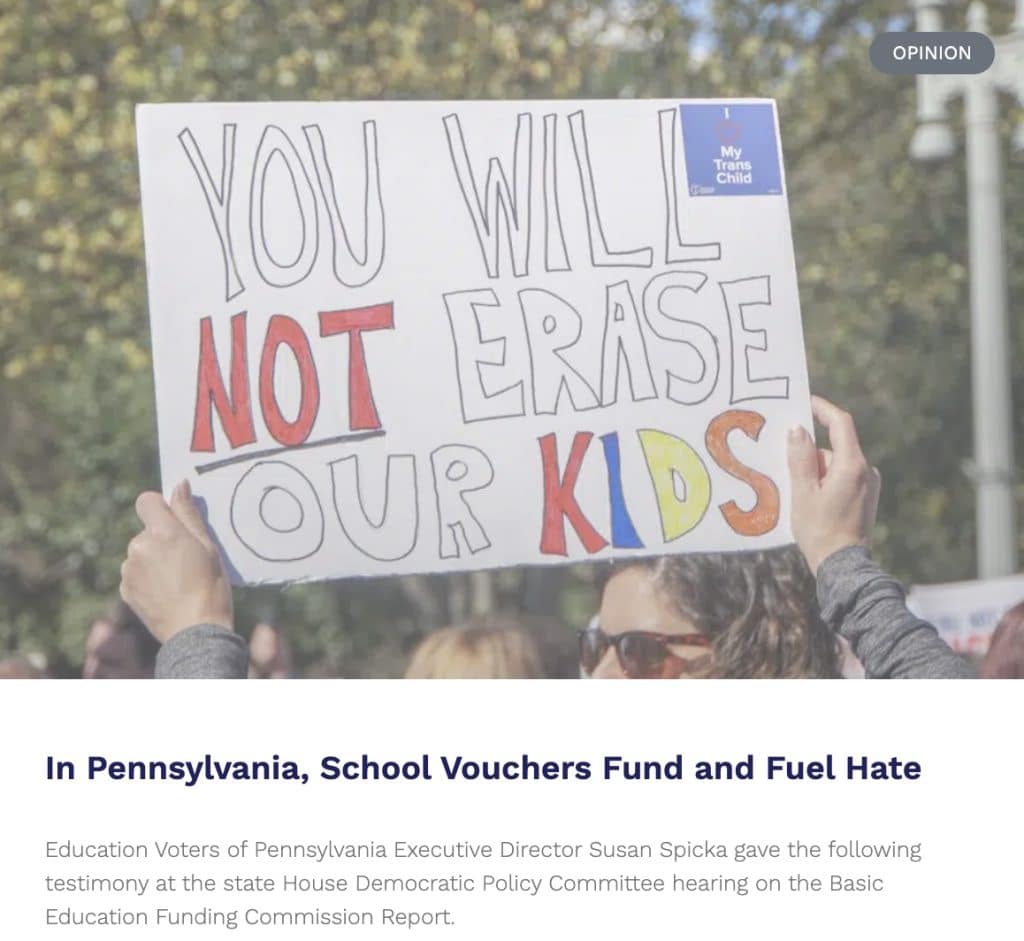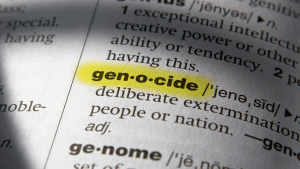The GOP’s Trump-backed “big, beautiful bill” has passed out of the House of Representatives, and taxpayers are rightfully giving lots of attention to features like the slashing of Medicaid and tax cuts for the wealthy. But buried within the bill is language that would create federal education private school vouchers and provide a tax dodge for the wealthy while eroding the public school system in favor of taxpayer-subsidized discrimination.
This federal school voucher bill was previously known as the Education Choice for Children Act, but now appears in the Big Beautiful Bill as Section 110109 “Tax Credit for Contributions of Individuals to Scholarship Organizations.” That’s not under the sub-heading of Education and the Workforce but instead under “Additional tax relief for American families and workers.”
The name change could simply represent the legislation’s real priority — tax avoidance rather than improving education. It may also reflect the political reality of school vouchers, which, as journalist Jennifer Berkshire notes, are neither populist nor popular with Trump’s own voters.
The voucher tax credit certainly favors the wealthy.
Individuals can contribute up to 10 percent of their income to scholarship grant organization that would administer and distribute school vouchers. Donors would receive a dollar for dollar tax credit, first come, first served, until the $5 billion total cap is reached. That cap represents a cost to US taxpayers of $5 billion.
Because the bill allows contributions of “cash or marketable securities,” donors could actually profit, according to analysis by the Institute on Taxation and Economic Policy. Here’s how it would work. The contributor bought stock for $2,000. At the time they donate the stock, it is worth, say, $10,000. The contributor would get a $10,000 tax credit, but would not be required to pay any tax on the $8,000 gains.
For example, ITEP estimates that Pennsylvania’s wealthiest man and enthusiastic school voucher supporter Jeffrey Yass could get an almost $150 million tax credit that would include a $13 million profit in avoided capital gains taxes.

The program would blow a $5 billion hole in the federal budget, resulting in either fewer services or a greater federal deficit, with the bill for either being passed on to taxpayers.
The vouchers themselves is not written to “rescue” low-income students from “failing schools.” Instead, it is nearly universal, available to wealthy families at excellent schools. Any household that has an income of less than 300 percent of the area median gross income would be eligible. No matter how wealthy your community, a large percentage of residents will be eligible for the vouchers. So in Lower Merion (median household income $117,914), any household that makes up to $353,742 would be eligible for a voucher at taxpayer expense. And that includes vouchers for students who are already attending a private school.
Further indication of the real concern of the bill’s authors is the lack of details about the vouchers themselves. The bill does not specify how large the actual voucher will be. The funds may be used for a variety of education-related expenses; however, the bill does not include any guidelines or regulations for businesses or schools hoping to collect voucher money. There’s no vetting or screening process to determine that a vendor is qualified to provide the service it offers. Under this bill, you can set up a private voucher-accepting school without having to prove to anyone that you are competent, capable, or not fraudulent. Nor is there oversight of the families themselves, no provision for regular auditing.
We have seen how this type of unregulated vouchers work in states like Arizona, where voucher funds were spent on trampoline parks, golf equipment, cosmetics, and clothing. We know that for years, voucher schools all over the country have taught creationism rather than science.
READ: Report Exposes How Charter Schools Are Doomed to Fail – at Taxpayers’ Expense
Pennsylvania has tax credit scholarship voucher programs — the Educational Improvement Tax Credit (EITC) and Opportunity Scholarship Tax Credit (OSTC). We don’t know much about how these funds are used or the results they are getting, because the law has set them up to operate in a kind of black box with little oversight or transparency. Are these vouchers helping poor children in failing schools? Are they producing high quality educational results? We don’t know, and the proposed federal vouchers will also operate in the dark. Taxpayers don’t get to know how the money is being spent.
We do know that taxpayer-funded vouchers in Pennsylvania, as in every other state that has them, subsidize a great deal of discrimination. Private schools accepting money in Pennsylvania reserve the right to reject students because of religious requirements, gender identity, academic or behavior issues, special needs, or, in some cases, any reason the school chooses — and they reserve the right not to say what the reasons are.
The federal voucher bill has some last-minute language that claims to protect the rights of students with special needs, but it is toothless and unenforceable. Even so, the Catholic church calls these kinds of requirements a “poison pill” because they find a requirement to be inclusive onerous, and characterize it not as an attempt to protect the rights of students, but to keep the private schools out of voucher programs by making “unreasonable” demands that the school meet the same inclusive requirements as public schools. School vouchers fund discrimination, and that means that school choice is really school’s choice, with the school free to reject any students.
Nor do vouchers get the job done. Josh Cowen, a longtime education researcher and author of The Privateers, looks at the data and argues, “If evidence meant anything to education policy, the story of school vouchers would have ended here.” Virtually all research that shows positive results for vouchers is research funded and created by voucher supporters, pushed through a pipeline that is well-lubricated with dollars from wealthy voucher fans.
Legitimate third party research shows that students who use vouchers show terrible results. Cowen attributes some of this to sub-prime private schools, created simply to cash in on voucher dollars.
No voucher program has ever been voted into existence by taxpayers, not even in deep red states. Last fall, 65 percent of Kentucky voters supported Donald Trump, and 65 percent of voters defeated a school voucher bill. Given the choice, voters have always rejected school vouchers.
READ: This Election Actually Showed Americans Still Love Their Public Schools
In every state with school vouchers, the laws were created by legislators circumventing the voters and with support from wealthy donors and their organizations, like the DeVos family’s American Federation for Children, the Koch-funded Americans for Prosperity, or the Bradley Foundation.
Texas provided a fine example of the process. After four failed attempts to get a voucher bill through the legislature, Governor Gregg Abbott used piles of his own money, plus stacks of money from out-of-state voucherphiles like Jeff Yass, not to take the voucher argument to the voters – but to replace legislators from his own party who refused to vote for vouchers. Notably, their opponents did not run on the voucher issue, but found other issues to use against them.
The primary tactic of voucher supporters is to find ways around that pesky democracy and those darn voters. The federal voucher bill takes that tactic to the next level, circumventing the voters and legislators of states that have stayed voucher-resistant. Pennsylvania’s long resistance to more expansive vouchers would be overridden by Washington.
To construct the voucher bill as a tax avoidance scheme is a two-fer, a way to get a favored policy while folding it into a larger system of tax cuts for the wealthy. The voucher language goes along with Medicaid and SNAP cuts as a way to pay for vast tax cuts for the wealthy at the expense of the not-so-wealthy taxpayers in this country.
The voucher bill, the Medicaid cuts, tax cuts for the wealthy, the DOGE-inspired slashing of services — these are all of a piece, taking us ever closer to country in which the wealthy don’t have to pay taxes to help government provide services. Instead education, health care, and all the rest would be commodities that you are responsible for buying on your own.
In that country, you would get the health care and education that you can afford. In that country, the wealthy would get the best that money can buy, and if everyone else gets something less—well, they should have made better choices in life. In that country, what you can afford is what you deserve. In that country, the promise of a good education for every student regardless of background, would be replaced with an unregulated free market and survival of the richest.
Federal vouchers would be only one step closer, but it’s a step we should not take. The House has passed the bill, but its progress through Congress isn’t done yet. It’s time to put pressure on Senators Fetterman and McCormick.







